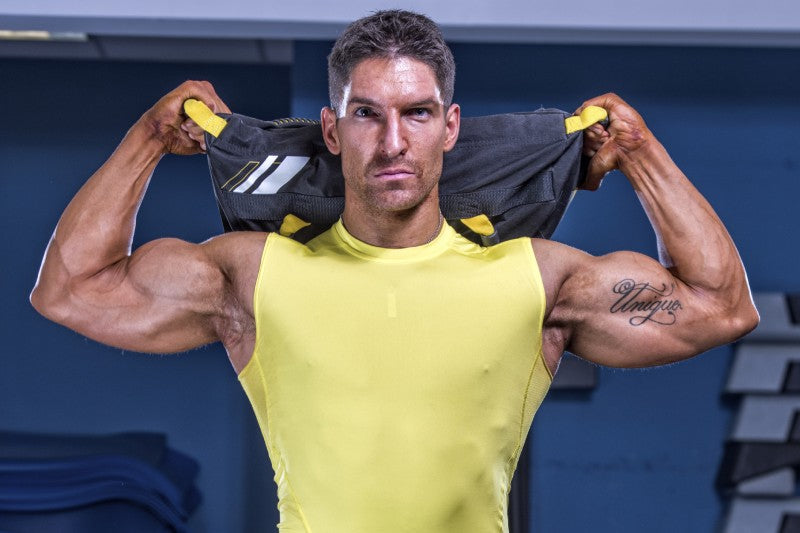
7 Tips to Hire the Perfect Personal Trainer
You've renewed your gym membership, received some new workout clothes for Christmas, downed your Core Fury pre-workout and you're ready to get to the gym and crush a workout! You hop out of the car, swipe your key card at the desk and step into the gym ready to take the first step towards your new goal.
Then you realize what everyone means when they talk about the New Year's gym rush. People are flooding the gym at all times of the day, looking to make 2015 the year they finally reach their fitness goals.
The unfortunate truth, however, is the majority of the people you see in January and February won't make to spring before quitting. A lot of people simply don't have the drive and fortitude to stick to their goals and put in consistent work.
Some though, despite good intentions, are lead astray by incompetent personal trainers that leave them disappointed and confused. The only weight loss they experience comes from their lighter wallet.
Gym newcomers should be able to trust personal trainers to be very educated and capable teachers. Unfortunately, most are worth far less than an old Richard Simmons workout video when it comes to building muscle and losing body fat.
Here's the good news. You can use the information and tips in this article to help you interview a personal trainer. It's time to ensure you're getting what you pay for, and working with a trainer that can actually help you reach and even surpass your goals.

One of the first things I would ask a trainer is to see the results of their past clients.
7 Tips to Pick the Perfect Trainer
Tip #1 - Look at Results of Past Clients
A common saying among fitness professionals is, "The best predictor of future behavior is past behavior."
This same saying holds true for the services a trainer can provide. One of the first things I would ask a trainer is to see the results of their past clients. A qualified trainer should be able to show you the degree of success he's had with previous clients.
I suggest looking at the results of several clients. Anyone working with numerous clients can have one or two make some sort of progress, but being able to consistently get results with multiple clients shows a lot more about the ability of a trainer.
All too often I see clients meet with their trainer week after week, yet they look exactly the same months, or worse, even years later. If he isn't helping you make consistent progress, what are you paying him for?
Tip #2 - What Type of Clients Have They Trained?
Going along with the previous point, I would also ask what type of clients the trainer has worked with before. If you're a mid-20s male trying to gain muscle mass in order to look better for the ladies, a trainer with a history of training mostly elderly women just trying to improve activities related to daily living (like walking or picking up a box properly) may not be the best fit for you.Likewise, if you're middle-aged and just trying improve your health so you can be there for your family years down the road, a trainer that largely deals with strength and conditioning of serious athletes and doesn't have past experience or knowledge pertaining to non-athletes may not match up to your needs.

Are you and your trainer putting in solid effort each session, or talking about your plans for the weekend?
Tip #3 - Look at Their Recent CEC Work
After a person earns their personal training certification, they are required to complete a set amount of continuing education credits (CECs) within a certain amount of time in order to maintain their certification. There are several top-rated professional fitness organizations that have slightly different requirements, but through my experience with the American Council on Exercise (ACE), there are several things a trainer can do to re-certify:- Quizzes based on articles found in monthly magazines sent by the organization.
- Workshops held in various locations around the country that focus on areas of expertise like sports conditioning or small group training.
- Online courses addressing various topics.
- Obtaining specialty certifications in things like youth fitness or orthopedic exercise.
That being said, with so many ways to complete CECS, it can be easy for a trainer to arbitrarily go through the motions and rack up CECS and not actually focus on learning valuable information and how to apply it to help their clients. A quiz here, an online course there, and the CECs requirements can be filled without any actual progress in a weak area or any specialization being made.
I want to see trainers consciously choosing CEC material they are interested in and challenged by. If a trainer isn't enthusiastic about what CEC work they've recently done, or worse yet, can't even name a few materials they've worked on, you may want to keep shopping around.
4. Look for Additional Certifications or Degrees

As I mentioned above, personal trainers have countless opportunities to add on specialty certifications through their accredited agency. If a person is trying to make a career out of personal training, I believe they should constantly be working to expand their education.
Let's say a personal trainer has been certified for four years and is using it as their sole means of income, yet the only certification they have is their initial personal training certification. My first thought would be, "Why, in the past four years, has this trainer not been motivated enough to improve their knowledge base?" Instead, I would prefer someone who is constantly working to broaden their knowledge of fitness to better serve their clients.
Likewise, it makes a trainer even more valuable when they have full degrees in areas like exercise physiology or nutrition that further improve their ability to help you reach your goals. Whether it's a formal degree or accredited certification, if a trainer isn't working hard to constantly improve themselves, I would find it hard to believe they could push me to do the same.
5. What Contacts do They Have in the Community?
Far from a "make or break" point, but I like to see personal trainers that have connections in the community. No matter how many certifications or degrees a trainer has, there are inevitably some things that will still be out of their scope of practice. For instance, if you have a nagging injury that just won't go away, a personal trainer wouldn't be able to diagnose your condition and obviously wouldn't be able to perform the tests and procedures needed to fix it.
A good trainer will spend time connecting with various professionals in the community, so when situations arise that are out of their scope they can easily refer you to a trusted professional that can work with you and the trainer to fix the problem and have you even closer to your ideal health and appearance.
Professionals like orthopedic doctors and registered dietitians are great people for a trainer to be in contact with. Seeing trainers with connections in the community shows me that they're willing to go above and beyond to make sure their clients' needs are met, even if it doesn't directly increase the amount they get paid.
6. Do They Train You or Talk to You?
A point brought up by a good friend and top bodybuilding prep coach, Cliff Wilson, while I was writing this article is to consider how much actual work the trainer and you are actually doing during the session. Are you guys putting in solid effort each session, or talking about your plans for the weekend?"While you want a trainer whose clients like them, you want to make sure they don't like them because they spend their entire session talking. I have seen some EXTREMELY popular trainers whose clients think the world of them but that is mostly because they are like old friend and just gab for the entire session rather than training!" - Cliff WilsonThis is something you won't really notice until after you've worked with your trainer for a few weeks. But keeping this in mind early will help you better maintain that balance of building a good relationship while still putting in the work needed to improve.

7. Do They Even Lift?
Well, I wouldn't exactly ask them this question, but I do think a very important factor in hiring a personal trainer should be their own training.
All too often I see trainers at gyms that live a paltry example of the lifestyle they're getting paid to teach their clients. Of course, not all personal trainers follow a strict training program like bodybuilding and physique athletes do - some trainers prefer to focus on things like endurance sports or outdoor activities. That's great, and things like this are enjoyable alternatives for people just wanting to get active, but if you're here on TigerFitness.com reading this article, chances are you're hiring a trainer so you can get bigger, stronger, and better looking, which is going to require time in the weight room.
You wouldn't take cooking lessons from a chef who hasn't actually cooked. Neither should you take training advice from someone who hasn't touched a dumbbell in years. If for no other reason, if your potential trainer is overweight and unable to maintain a healthy, attractive physique, then how do you expect them to help you achieve one?
If the trainer looks like they need a trainer, it's time to move on!
Problem Solved
Just like in any profession, there are some people who are qualified trainers and some that leave you wondering how they are able to pay their bills. These considerations should not only help you wade through unqualified trainers, but also recognize that there is more to finding a capable trainer than someone with a nice body or a certification.Some people, through good genetics and some luck, are able to achieve a good physique despite inaccurate methods and beliefs - not because of them. These points should help you determine if a trainer is actually knowledgeable and qualified to help you reach your goals or if they're better off stepping aside so real gainz can be made!

Leave a comment